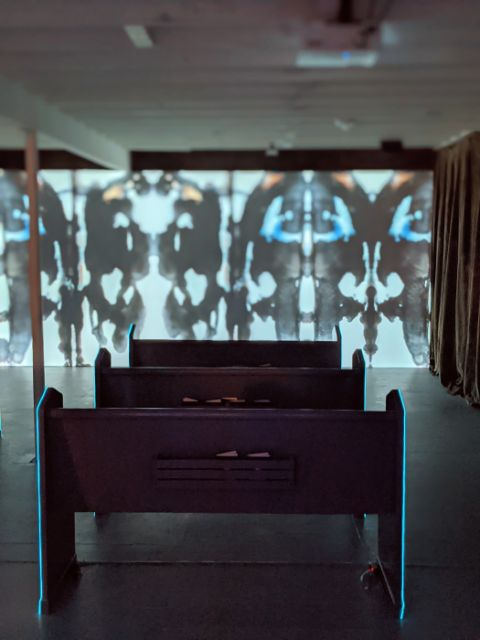GOD AFTER GOD
Keynote by Charles Mudede
Keynote
Fr., 24.5.2024
19:30
Haunani-Kay Trask Hall
In English with German translation
Free entry

Chapel by Jacob Peter Fennell and Reilly Donovan. Photo: Charles Mudede
Charles Mudede’s keynote takes as its departure point the penultimate track of Robert Hood’s techno masterpiece ‘Sleep Cycle’ on the album Minimal Nation. The inspiration for this work, which runs for nearly seven minutes, is a Black-American church service. The spirit can be heard moving through the choir’s 2/4 clapping, the whooping of the preacher’s sermon can be anticipated—it’s all there. But this is not a church for humans, but robots. Despite the music’s severe minimalism and mechanical determination, the God of Black America is very present for this congregation of androids. And this is by no means a fanciful reading of ‘Sleep Cycle’—Hood, a key figure in the development of the minimalist branch of Detroit techno, is deeply religious and famously opens his DJ sets with a sermon.
Hood’s church robots are not, however, alone in the universe. Their kind can also be found in the 2004 TV series Battlestar Galactica. Here, the robots, called Cylons, are mechanical and bioengineered. They have achieved the highest level of artificial intelligence and self-awareness. They believe in God and the afterlife. Indeed, in episodes that happen on a planet called New Caprica, a Cyclon communes with God by repeatedly committing suicide. There is, for the robot, an afterlife, and it is only here, in death, that their God can be confirmed and experienced.
There is only a small jump from the Black American robot service and the God-obsessed Cylons to the chapel featured in the 2021 Museum of Museums exhibit The Word of the Future by Jacob Peter Fennell and Reilly Donovan. Again, the worshippers in this and the show’s other installations are not human but AI. How to bring these dreams of the artificial divine together? Mudede’s lecture will interrogate exactly this question, taking as a guiding point an idea proposed in 2010 by the French philosopher Quentin Meillassoux: God may not exist today but might exist in the future.